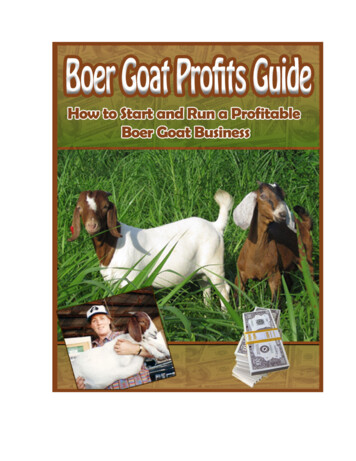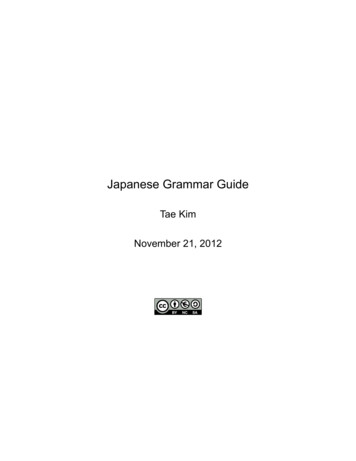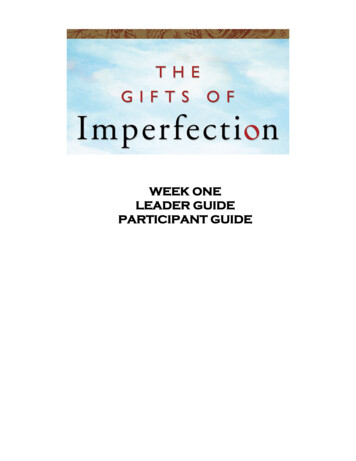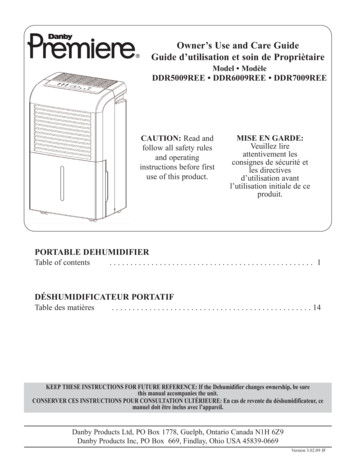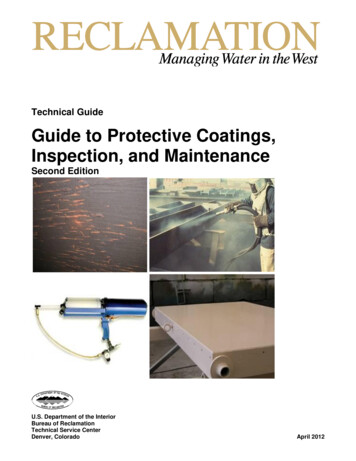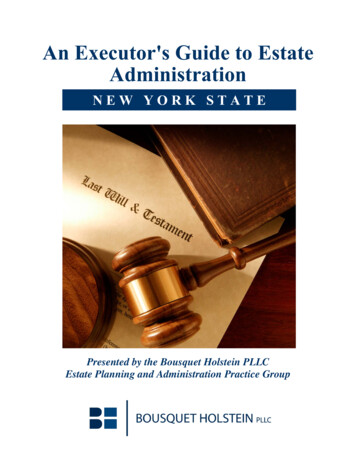
Transcription
An Executor's Guide to EstateAdministrationNEW YORK STATEPresented by the Bousquet Holstein PLLCEstate Planning and Administration Practice Group
An Executor's Guide to Estate AdministrationNew York StateTABLE OF CONTENTSINTRODUCTION . 3PRELIMINARY MATTERS. 4FIRST STEPS . 5PETITION FOR PROBATE OR APPOINTMENT . 6ADMINISTRATION OF ESTATE AFTER APPOINTMENT . 8VALUATION AND CLASSIFICATION OF ASSETS . 13PRESERVE THE ASSETS . 17PAY CLAIMS, EXPENSES, AND TAXES . 18DISTRIBUTE THE REMAINING ASSETS . 19CLOSING THE ESTATE. 20A FINAL WORD . 21BOUSQUET HOLSTEIN ESTATE PLANNING AND ADMINISTRATION . 22Prepared by Virginia A. Hoveman, Esq. August 2015 - Published by Bousquet Holstein PLLCAll Rights Reserved. Printed in the United States of AmericaThis publication is provided at no charge by the publisher to parties interested in this subject matter. No part of thispublication may be reproduced or distributed in any form or by any means without prior written consent of thepublisher. Material in this publication is for educational purposes only. This publication is being provided with theunderstanding that neither the author nor the publisher is providing legal or professional counsel. Neither theauthor nor the publisher assumes any liability for any errors or omissions or for how this publication or its contentsare used or interpreted or for any consequences resulting directly or indirectly from the use of this publication. Forlegal advice, please consult your personal attorney or the appropriate professional.2
An Executor's Guide to Estate AdministrationNew York Stateperson's Last Will and Testament (referred to in thisguide as the "Will") is authentic, properly signed andadministered consistent with its instructions. TheSurrogate's Court in the county in which thedeceased person last resided oversees this process.INTRODUCTIONWhen a resident of the State of New York passesaway, the Last Will and Testament executed by thatindividual must be "admitted" to probate, in mostcases, to secure the authority to pay final bills, payfinal taxes and distribute the remaining assets to thepersons and entities named in the individual’s LastWill and Testament. The person named in the Willas the Executor has the legal authority to act onlyafter the Will is admitted to probate.Many people think that probate is a very complexand expensive process that should be avoided at allcosts. While that may be true for some estates andin some counties where the case loads are high, forthe most part, the probate process is not complex,time consuming or expensive. There are cases whencomplications can increase costs and complexity; forexample, if the deceased person was the owner of abusiness or if there is ongoing litigation. The mostfrequent issues that increase the expense andcomplexity of probate are disagreements amongbeneficiaries or with the Executor.The cost and expense of probate in New York Statecan be minimized if the beneficiaries and theExecutor are prepared for the process. This guideoffers an overview of the probate estateadministration process in the State of New Yorkfrom the perspective of the person responsible forhandling the estate – the Executor. The guide doesnot address the specific requirements of handling anestate if a person dies in the State of New Yorkwithout a Will1. However, an Administrator – theperson responsible for an estate with no Will - mayfind the information included in this discussionhelpful.When Probate is Not RequiredIn the first instance, it is important to know whenprobate is NOT necessary. Probate is not requiredfor all estates. Family Exemption: Under New York Law, thesurviving spouse and dependent children areentitled to receive certain assets and funds beforeany estate proceeding is required ("familyexemption"). For example, a spouse is entitledto receive cash of 25,000 before any estateproceeding is required. Under New York law, aspouse is entitled to transfer one motor vehiclewith a value of 25,000 or less without resort toprobate.The death certificate and titledocuments will be required by the Department ofMotor Vehicles in order to complete the transfer. Small Estate Administration: If the assets of thetestator are valued below 30,000 (after theFamily Exemption amounts) and if the testatorowns no real estate, the estate may beadministered using a small estate proceeding.The small estate proceeding is a simplifiedprocess and less expensive process which doesnot require the filing of a petition for probate.This guide is not intended as a "how to" booklet or asubstitute for competent legal or tax advice. Rather,it will offer an Executor a perspective of his or herresponsibilities and duties and the beneficiariesinformation as to what to expect from the Executorof the estate.Probate – Demystifying the ProcessSimply put, "probate" is the legal procedure bywhich a court in the State of New York, typically,the Surrogate's Court, ensures that the deceased1If a person dies a resident of the State of New York withouta Will, then the "intestate" laws of New York control theprocess that has to be followed. The person responsible forhandling the estate of someone who dies without a Will inNew York is called the "Administrator." The intestate lawsof the State of New York identify who may act asAdministrator and who is entitled to receive the assets of theestate.3
An Executor's Guide to Estate AdministrationNew York State Although the authority to act cannot be granted untila petition for probate has been filed, it is wise to tryto locate some preliminary financial informationprior to filing a petition for probate.Thisinformation will help the nominated Executor andthe estate's attorney decide whether and how toproceed.Joint and Survivorship: Probate is not required totransfer funds to a joint owner with rights ofsurvivorship or a beneficiary of an account.Therefore, if the testator did not own any assetsin his or her name alone, or the account has abeneficiarydesignation,e.g.insurance,retirement funds or Transfer on Deathdesignation then no probate proceeding isrequired. The testator’s ownership interest inthese assets has to be reported on an estate taxreturn, if one is required, but no probateproceeding is needed to change the ownership ofthe funds. Revocable or Other Trusts: Probate is notrequired if all of the assets owned by thedecedent are titled in the name of a trust ratherthan in the individual name of the decedent. Insufficient Assets to Pay Debts:If a preliminary review of the testator’s debtsand obligations exceed the value of the testator’sassets, it may not be advisable to proceed withprobate. The filing of the petition for probatewill require the Executor, if appointed, tocomplete the estate. Therefore, if there areinsufficient assets with which to pay allcreditors, a judicial settlement of the estate willlikely be required. The judicial settlement is anadditional cost and expense to the estate. Thereare reasons and circumstances under which itmight be desirable to proceed with probate, evenif the total debt exceeds the total value of theassets, but it is recommended to retainexperienced counsel before proceeding withprobate under these circumstances.There is no time limit to the filing of a petition forprobate in New York. However, if there issignificant delay in the filing of the petition, otherimportant deadlines such as tax filing deadlines,discussed below, may be missed and the nominatedExecutor may be held responsible for the delay.The nominated Executor may hire experts to helpwith the decision as whether or not to probate theWill, to assist with the probate process and to assistwith planning and filing the required tax returns forthe estate, if any. In most cases, it will be lessexpensive to retain a competent attorney to assist inthe process at the beginning rather than retaining oneonly after things have gone wrong. The size andcomplexity of the estate, as well as the expertise,experience and time constraints of the Executor willhelp guide the Executor's decision as to what tasksthe Executor will handle personally and what tasksshould be handled with the assistance of an attorneyand/or accountant.Defining TermsIt may be helpful to understand the meaning of somesignificant terms that are used in the probate process."Testator" - The testator is the deceased individualwho signed his or her "Last Will and Testament"."Distributees" – These are the relatives of thetestator who must receive formal "service" of thefiling of the petition for probate. These are thepeople who can "object" to the Will. The New YorkState statute defines which relatives are distributeesfor probate purposes. The statute provides that thedistributees are the relatives who would havereceived the assets of the deceased person, had thatperson died without a Will. For example, if thedeceased person died without a Will and wasmarried and had four children, the spouse and thefour children would be required by law to divide thePRELIMINARY MATTERSWhile the Executor is named in the Will, the"nomination" as Executor does not grant the legalauthority required to act. Only when a Decree orProbate is entered by the Court is the person able toact as Executor. The Surrogate’s Court will issue"Letters Testamentary". Certified copies of theseLetters are needed by the Executor to prove to 3rdparties, e.g. banks, that the Executor has authority toact on behalf of the estate.4
An Executor's Guide to Estate AdministrationNew York StateTypically, the testator will keep this informationtogether with copies of income tax returns, and otherfinancial records in his or her name.assets owned by the descendent at death. Therefore,the spouse and the children, who are not named asExecutor, must be served with process in the probateproceeding because they are the "distributees". Thisis true even if the Will leaves all of the assets to thespouse.It is possible that the family and the nominatedExecutor will not be able to locate significantinformation prior to appointment of Executor.However, the following is a list of some of theinformation that will be helpful, if not required, inorder to complete the duties as Executor:Asking for HelpIf the nominated Executor wishes to retain theservices of a lawyer who is knowledgeable aboutestate administration, the nominated Executor willenter into an engagement agreement with the lawyerwho will provide specified services according to thearrangement desired by the nominated Executor.Nevertheless, the nominated Executor will generallyassist in securing information and working with theattorney to complete the estate administrationprocess. Birth and/or adoption certificate Marriage certificate Divorce decree or separation agreement Prenuptial Agreement All Trusts created by the testator All Trusts for which the testator was acting asTrustee Safe deposit box and keys Bank passbooks Financial statementsLocating Information Income tax returnsGenerally, the testator stores a copy of his or herWill with the important tax and other financialinformation in a desk or cabinet in the testator'shome. In some cases, the testator has placed a copyof the Will in a vault, safe deposit box or some otherlocation. If the nominated Executor does not haveaccess to the home or a safe deposit box and theExecutor believes the original Will is in the home orthe safe deposit box, a motion to access the homemay be presented to the Surrogate's Court prior tothe petition for probate. Gift tax returns Military service records Social Security number and cards Diplomas, educational records Medical and health records Cemetery site deed or cremation instructions Passport Citizenship papersWhile most attorneys who focus their practice onestate administration prepare Estate Tax returns andEstate and Trust fiduciary income tax returns, it islikely that the final personal income tax return of thetestator will be prepared by the accountant who wasworking with the testator prior to his or her death.Because the analysis as to whether to proceed andhow to proceed must often be made before completefinancial information is available, it will beimportant to begin to gather and locate as muchinformation about the estate as possible. If theattorney for the testator has the original Will, it maybe that the attorney also has information helpful tolocating and valuing estate assets.FIRST STEPSFuneral ArrangementsGenerally, the deceased person will have advisedfamily members if he or she made funeralarrangements in advance. It is often the case thatpayment for those arrangements has also beencompleted.5
An Executor's Guide to Estate AdministrationNew York StateA separate certified copy of the death certificate willbe required to be submitted to each account holder,life insurance company, and bank. The Surrogate'sCourt requires the filing of a certified copy of thedeath certificate with the petition for probate.If not, funeral arrangements are generally made bythe surviving spouse, children, or other familymembers rather than by the Executor. The deceasedperson may have specifically designated anindividual as the authorized agent of the deceasedperson to dispose of his or her remains. Thedeceased person's (also known as the "decedent")wishes should be respected if they are known, but donot have to be carried out if they are unreasonable orfinancially burdensome.The WillThe original Will is required to be submitted to theSurrogate's Court with the probate petition and othersupporting documents. If the original Will cannot belocated, it will be necessary to contact the court todetermine if the Will was filed with the court.In the event that the deceased individual has madean anatomical gift it will be necessary to notify thefuneral director as soon as this information isknown. New York State permits individuals toregister such gifts with the New York StateDepartment of Health.If not, then it will be necessary to communicate withthe professionals who most recently worked with thetestator to inquire as to the location of the original.If the original was in the possession of the lawyerwho drafted the Will and the lawyer cannot locatethe original, it may be possible to probate the copyprovided the Surrogate's Court is satisfied with theapplicable and required affidavits explaining the lossof the original.The Executor is responsible for keeping a record ofthe funeral expenses and bills paid from the estate'sassets. In most cases, the probate of the Will has notbeen completed at the time the funeral directorrequires payment. It is common to arrange for anadvance of funds by a family member with theunderstanding that as soon as funds are availablefrom the estate, the family member will bereimbursed upon tender of the invoice and proof ofpayment.The Executor may, but is not required to, hire theattorney who drafted the will to assist with estateadministration matters. It is generally recommendedthat the Executor hire an attorney whose practice isfocused on estate planning and estate administration.Reasonable funeral expenses and burial expensesincurred as a result of the decedent’s death arepayable from the estate.Reading the WillThere is no requirement under New York Law togather the family together to "Read the Will". Thefamily may wish to gather or more typically, theExecutor will provide photocopies of the Will tofamily members who are entitled to receive assetsunder the Will. This informal sharing is not part ofthe formal probate requirements.Funeral expenses paid by the estate or reimbursed bythe estate are deductible on the estate's Estate Taxreturn, if any. However, the costs of a celebrationfor family and friends; and costs of travel, meals,and lodging for the persons attending the funeral aregenerally not deductible.PETITION FOR PROBATE ORAPPOINTMENTThe funeral director will generally order the initialdeath certificates. It is important to confer with theExecutor and the estate attorney to determine thenumber of certificates that are likely to be required.If additional certificates are required, they can beordered from the Bureau of Vital Statistics or theCounty Health Department (as applicable to theparticular county).Formal ProbateAfter a decision has been made to probate the Will,the nominated Executor (or the person who wishesto act as Executor) will meet with the attorney forthe estate and provide the information needed toprepare the petition and the supporting documents6
An Executor's Guide to Estate AdministrationNew York Staterequired to be filed with the Surrogate's Court. ThePetitioner is usually the nominated Executor. If thenominated Executor does not wish to act or cannotact, then the nominated successor Executor may bethe Petitioner.These requirements include:(1)Submission of the original Will with the selfproving Affidavit of Witness to the Willfiled with the Surrogate's Court;If no named individual wishes to act, a descendant ofthe testator may act. New York Law specifies whois entitled to act if the nominated Executors cannotor choose not to act.(2)Service of process (via Citation) on alldistributees and other parties as directed bythe court. In lieu of formal service ofprocess, the parties may execute a Waiverand Consent.(3)Notice of the Probate Proceeding must bemailed to all beneficiaries named in the Will.(4)In the event that the Petitioner is not theinitial nominated Executor the court willrequire either a signed "renunciation" by thenominated Executor or proof of service ofprocess of the petition on the nominatedExecutor.It will be necessary to secure the names andaddresses of the beneficiaries named in the Will andof the "distributees" (see definition above) of thetestator. In addition if any beneficiary is a minor,that beneficiary's birthdate has to be provided to theCourt.An affidavit and Family Tree may be required ifthere is only one distributee or if there are noimmediate relatives alive.Preliminary LettersThe court will generally set a "return date". If allparties have consented to probate of the Will, nohearing will be required. If the parties do notconsent, then the probate process may become morelitigious with depositions, discovery and hearingrequirements. It is beyond the scope of this guide toaddress that circumstance. If the Will is notadmitted to probate with all of the parties inagreement, the nominated Executor and beneficiarieswill need to retain separate counsel.Under some circumstances, it may be necessary toseek preliminary letters of appointment from thecourt to allow the Executor to address certain estateadministration issues while the probate proceeding ispending. Generally, the probate process takes 30-60days; however, in some counties and under somecircumstances, the proceeding may be much longer.For example, if there are distributees who cannot befound or if the Court's docket is very crowded, itcould take months to secure the appointment of theExecutor. In issui
An Executor's Guide to Estate Administration New York State 3 INTRODUCTION When a resident of the State of New York
